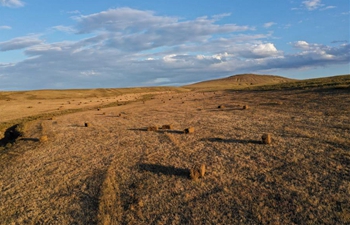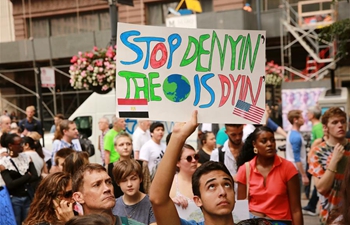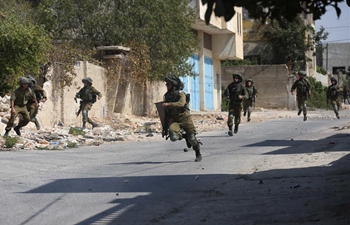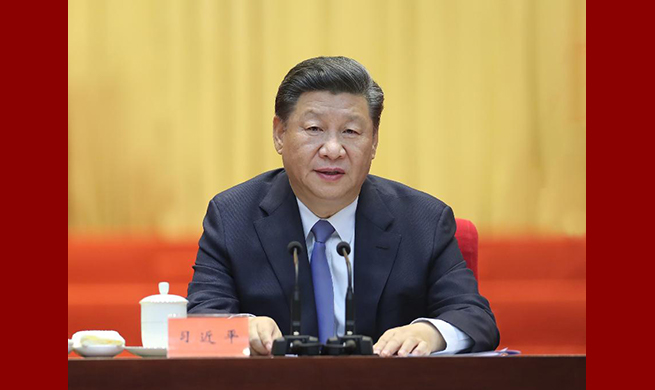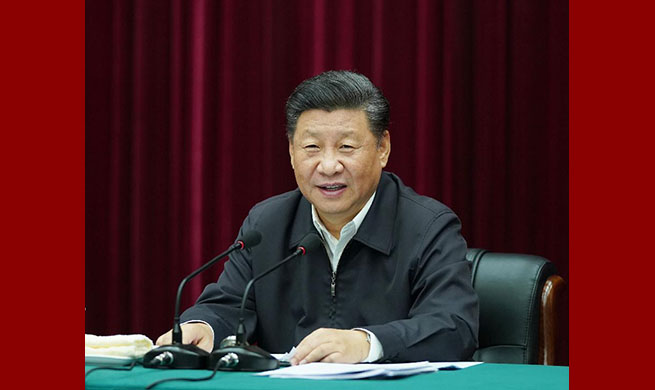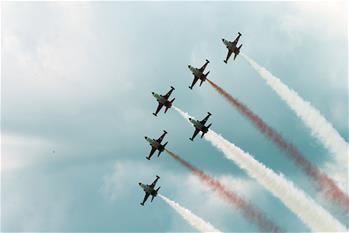ISTANBUL, Sept. 21 (Xinhua) -- A Turkish offensive against U.S.-backed Kurdish militia in Syria is highly unlikely despite Ankara's threat of action which looks more like a bluff aimed at strengthening its hand ahead of an expected meeting between Turkish and U.S. presidents next week, analysts said.
The odds are against a Turkish cross-border military operation on the Kurdish militia, Faruk Logoglu, a former senior diplomat, told Xinhua.
Ankara has recently expressed strong dissatisfaction with U.S. attitude toward a safe zone project which is being jointly conducted in the Kurdish militia-held territory in northeastern Syria.
Turkey will initiate its own action plans to eliminate the Kurdish militia if no consensus is achieved in the safe zone negotiations with the U.S. within two weeks, Turkish President Recep Tayyip Erdogan said Monday.
"The YPG would resist it, the Syrian government opposes it and the U.S. has made clear such a move would be unwelcome," noted Logoglu.
Washington has several thousand troops and reportedly more than two dozens of military bases on the territory controlled by the Kurdish militia known as the People's Protection Units (YPG), and has repeatedly voiced its readiness to protect the YPG, which it used as a ground force against the Islamic State, in case of an attack.
The probability of an operation against the YPG in the face of U.S. opposition is near zero given Turkish need for Washington's support for its ailing economy and the current political and military situations, said Cahit Armagan Dilek, a former staff officer in the Turkish military.
In a bid to soothe Ankara's security concerns and block any Turkish military intervention, the U.S. agreed to jointly create a safe zone in the YPG-held territory, as Ankara sees the Kurdish fighters as terrorists and their presence along its border as an existential threat to it.
Erdogan is expected to meet with his American counterpart Donald Trump on the sidelines of the UN General Assembly next week, and the details regarding the safe zone, boosting bilateral trade and the Syrian war in general are expected to dominate their meeting.
"Turkey might get a few more promises from the U.S. concerning the safe zone, and that would be enough for Ankara to claim 'we got what we wanted,'" remarked Logoglu. "This would shelve the idea of an operation by Turkey."
Earlier this month, Syria condemned a joint Turkish-U.S. ground patrol conducted under the safe zone deal in parts of the YPG-held territory as a violation of its sovereignty.
Dilek expects the Erdogan-Trump meeting to be mainly focused on bilateral trade and big foreign loans Ankara is hoping to get, arguing the Turkish leader was simply sort of bluffing by threatening a military intervention to make Washington more generous in its offer of economic support to Ankara.
Turkey has a huge need for foreign loans to run its debt-stricken economy which is suffering from recession, high inflation and unemployment.
U.S. Secretary of Commerce Wilbur Ross was in Turkey earlier this month for an exceptional five-day working visit during which he also met with Erdogan.
The two countries hope to increase, in the long run, bilateral trade volume to 100 billion U.S. dollars, which was around 20 billion dollars last year.
Ankara demands that the safe zone, which it says should be under its full control, go as deep as 30-40 km into the YPG-held territory from its border, while Washington reportedly proposed a two-tiered safe zone in the first 5 km of which the YPG would have no presence. The Kurdish militia would be required to withdraw its heavy weapons from an additional 9-10-km-deep strip of land.
"The West knows Erdogan's hand is weak and Turkey's economy cannot support a major military operation, but considering Erdogan's unpredictable nature, the West would come up with proposals that help Ankara cope with its problems," said Dilek, director of the Ankara-based 21st Century Turkey Institute.
Turkey recently criticized the U.S. steps regarding the safe zone as being cosmetic, accusing its NATO ally of stalling on the project and actually planning a buffer zone to protect the YPG.
On Wednesday, a Pentagon official said Washington continues to provide military supplies to the Syrian Democratic Forces (SDF) against the Islamic State.
The SDF, an alliance of Kurdish and Arab fighters numbering 50,000-60,000, is largely dominated by the YPG.
"The U.S. would not back off from its position on the safe zone because of Erdogan's threat," Dilek commented on the Pentagon's latest statement.
Erdogan threatened a military operation against the YPG at a summit in Ankara on Monday, in which he talked about the Syrian crisis with his Russian and Iranian counterparts Vladimir Putin and Hassan Rouhani.
The three leaders underlined their commitment to Syrian territorial integrity, but Erdogan's guests avoided open support to Ankara for its cross-border operation plan.
While Erdogan described the YPG as the biggest obstacle to Syrian territorial integrity, Rouhani said there are terror groups in the U.S.-controlled area and Tehran is against military presence in Syria of any foreign powers not invited by Damascus.
Rouhani added that the Syrian government should have the control over the Kurdish-held territory.
Turkey hopes to resettle in the safe zone at least two million of the more than 3.6 million Syrian refugees being sheltered on its land.
For his part, Putin said Turkey has the right to act for its national security, adding, however, that all foreign powers should get out of Syria after the crisis is resolved.
The call by Putin and Rouhani for foreign forces not authorized by Damascus to get out is not only intended for U.S. troops, but also "an indirect message for Turkish forces as well," said Logoglu.
"While both might enjoy the tension between the two allies, they would not warmly embrace the idea of Turkey gaining control of a large swath of Syrian territory," he added.
Turkey already controls al-Bab and Afrin regions in northwestern Syria, which it captured from the Islamic State and the YPG respectively in past operations.
Neither Russia nor Iran would provide military or logistical support to Turkey in case of an operation on the YPG, Dilek stated, saying Moscow would simply be happy with a clash between Turkey and the U.S. as it would cause a major crack in the Western alliance.
